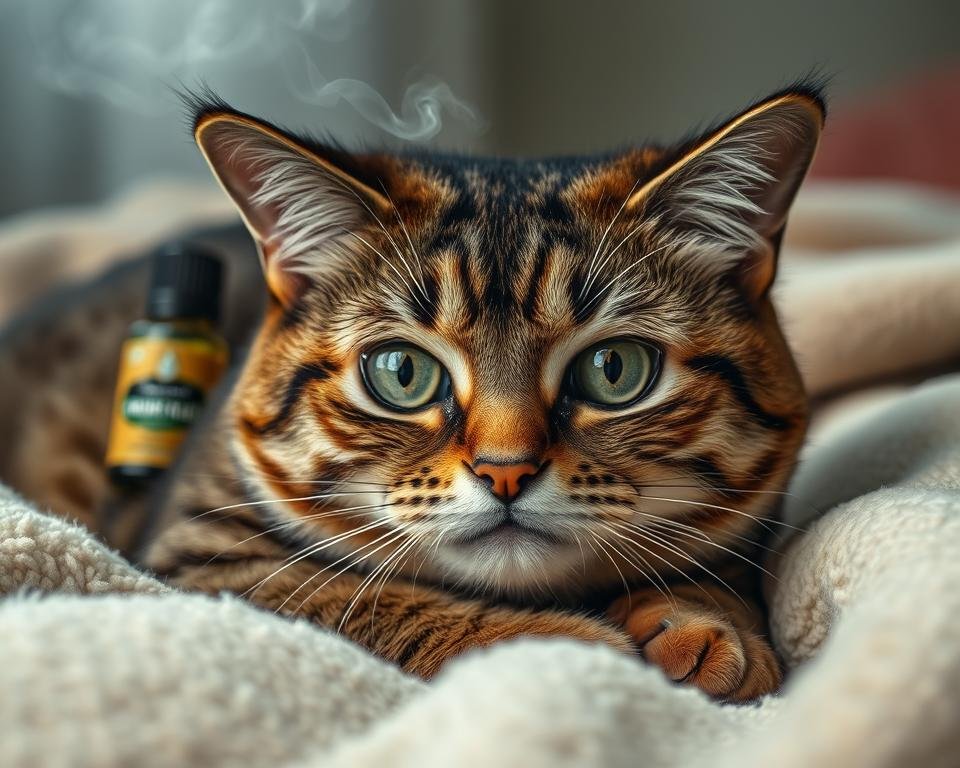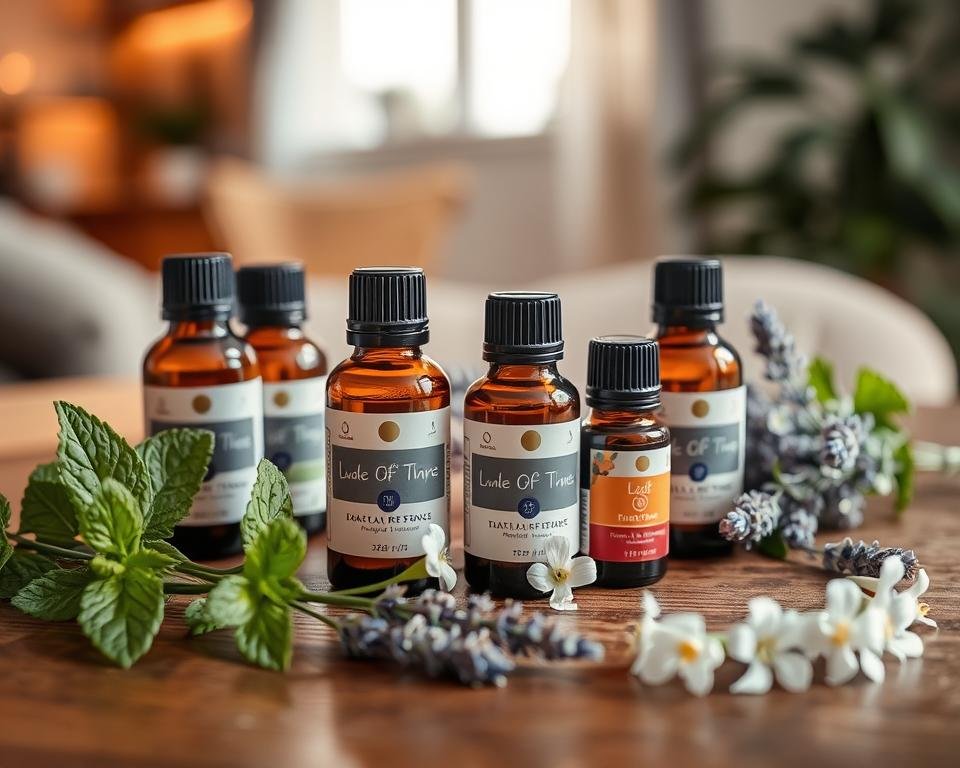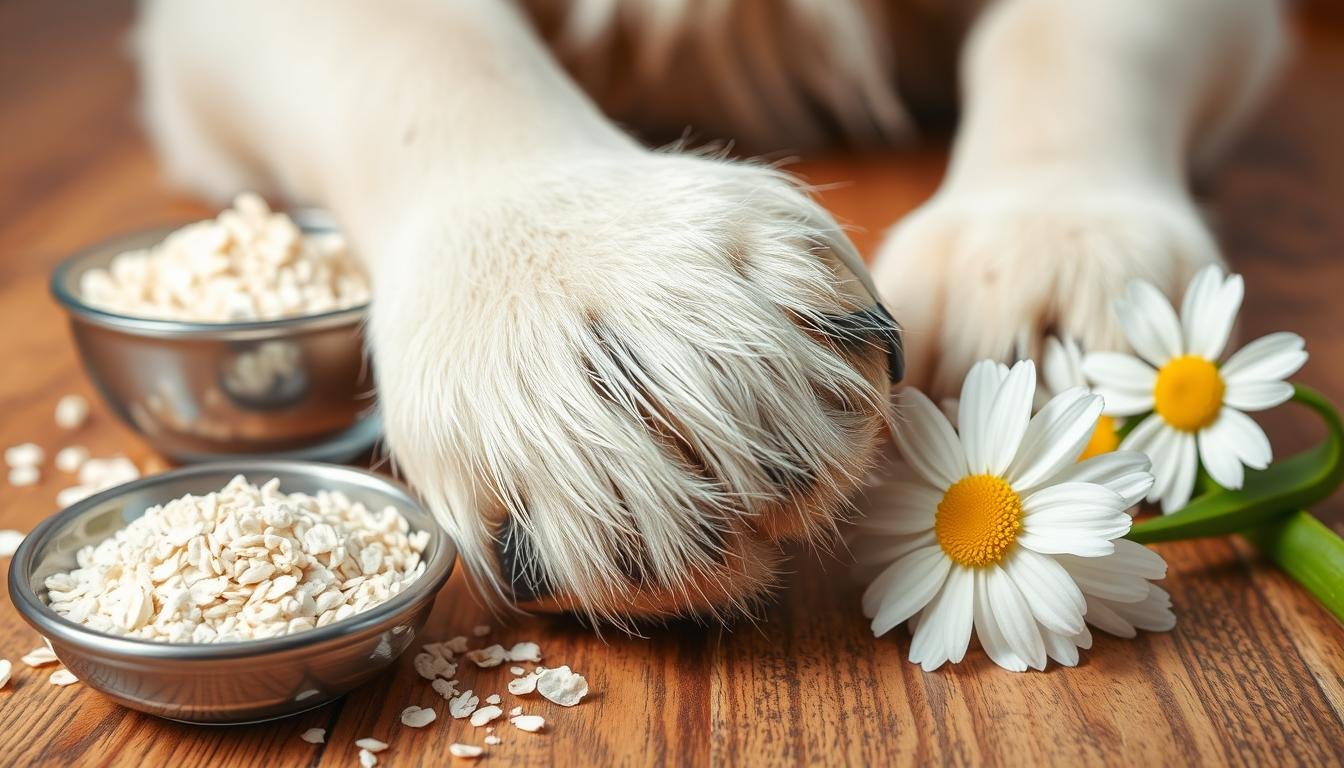Peppermint oil is great for humans but can be very harmful to cats. Cats can’t break down the compounds in essential oils like peppermint. This makes them very likely to get sick from it.
This guide will tell you about the dangers of peppermint oil and other essential oils. It’s for cat owners who want to keep their pets safe. You’ll learn about health risks, how cats can get exposed, and important safety steps to protect your cat.
Understanding Essential Oils and Their Effects on Cats
Essential oils are very strong plant extracts with strong smells. They can be good for people but are dangerous for cats. Cats are very sensitive to the chemicals in essential oils because of their unique body.
What Are Essential Oils?
Essential oils come from plants like flowers and herbs. They are made through a special process called distillation. Because they are so strong, they can be harmful to cats.
How Cats Process Essential Oils
Cats can’t break down certain chemicals in essential oils. This is because they lack a special enzyme in their liver. Without this enzyme, cats can’t get rid of these harmful substances.
The Science Behind Cat Sensitivity
The strength of essential oils is a big factor in how dangerous they are for cats. Studies have shown that even a little bit of essential oil can be bad for cats. Their bodies are very sensitive to these strong chemicals.
“Cats are more sensitive to essential oils than dogs or humans due to their inability to metabolize certain compounds found in these oils.”
Cats can’t handle essential oils well because of their body’s limitations. This can cause serious problems like liver damage and seizures. It’s important to know about these risks to keep our cats safe.
Is Peppermint Safe for Cats: The Truth About Toxicity
Peppermint oil is a big worry when it comes to cats and essential oils. It’s very toxic to cats, whether they eat it, breathe it in, or get it on their skin. Even a little bit can be very dangerous for our cat friends.
Other oils like clove, eucalyptus, tea tree, and citrus are also toxic to cats. Cat owners need to be very careful not to use these oils near their pets to avoid poisoning.
Peppermint oil is toxic because of its main ingredient, menthol. Cats have a hard time breaking down menthol. This can cause serious harm.
“Peppermint oil is highly toxic to cats and can lead to signs of poisoning or liver failure.”
While peppermint oil might help humans, it’s bad for cats. Cats might have trouble breathing, drool, vomit, feel weak, or even have seizures if they get too close to it.
To keep your cats safe, don’t use peppermint-based products or let peppermint oil diffuse in your home. The dangers are too great, and the risks to cats are too serious.
We need to watch out for our pets and keep them safe from dangers. Knowing how toxic peppermint and other oils are helps us make better choices for our cats’ health.
Common Symptoms of Peppermint Oil Poisoning in Cats
Peppermint oil is very harmful to cats. Pet owners need to watch out for the dangers. The menthol in peppermint is toxic to cats, causing many symptoms.
Signs of peppermint oil exposure include vomiting, drooling, and trouble breathing. Cats may also have muscle tremors, unsteadiness, lethargy, and seizures in severe cases.
Long-term Health Effects
Long-term exposure to peppermint oil can harm a cat’s health. Liver damage and respiratory issues are possible. Cats with health problems like liver or stomach diseases are at higher risk.
When to Seek Emergency Care
If a cat shows signs of peppermint oil exposure, get emergency vet care right away. Symptoms can get worse fast. Quick diagnosis and treatment are key to prevent serious harm.
Don’t try to make the cat vomit or give activated charcoal. These actions can make things worse. Call a vet or the Pet Poison Helpline immediately for the best care.

Peppermint oil is just one of the essential oils harmful to cats. Pet owners must watch out for risks and act fast if their cat shows signs of exposure. Knowing the symptoms and getting quick vet care can protect cats from essential oils harmful to cats.
How Cats Can Be Exposed to Peppermint Oil
Cats can get exposed to peppermint oil in many ways, which is bad for their health. They might touch it on their skin, which can let the oil get into their body. They could also swallow it while cleaning themselves.
Another risk is breathing in the fumes from diffusers or products with essential oils toxic to cats. Even a little bit of eo for cats on their fur can be dangerous if they lick it.
It’s very important for cat owners to watch out for products with essential oils toxic to cats in their homes. Keeping these products safe, making sure there’s good air flow, and not using eo for cats is key to keeping their cats safe.
“Essential oils are quickly absorbed by cats through their skin and mouth, building up in their liver. More oil means more harm to cats.”
- Cats are very likely to get sick from breathing in essential oils from home diffusers.
- If cats lick essential oil off their skin, it can poison them or make them very sick.
- The FDA hasn’t approved essential oils for use in people or pets.
To keep their cats safe, owners need to know the dangers of essential oils toxic to cats. They should take steps to prevent their cats from getting too close to these harmful substances.
Diffusers and Their Impact on Cat Health
Diffusers are popular for spreading essential oils in the air. But, they can be harmful to cats. Devices like reed diffusers, heat diffusers, and nebulizers can release what scents are toxic to cats in your home. This can put your cat’s health at risk.
Types of Diffusers
Reed diffusers use capillary action to slowly release fragrance. Heat diffusers vaporize oils with warmth. Nebulizers create a fine mist with ultrasonic vibrations. All these can spread essential oils harmful to cats and harm your cat’s health.
Safe Alternatives for Cat Owners
If you have a cat, it’s best to avoid essential oil diffusers. Instead, use cat-friendly air fresheners or natural ventilation. Open windows, use fans, and consider natural deodorizers like baking soda. This keeps your home smelling fresh without harming your cat.
Proper Ventilation Guidelines
If you must use a diffuser, make sure the area is well-ventilated. Watch your cat closely for any signs of distress. If your cat shows symptoms like excessive drooling, watery eyes, or trouble breathing, get them out of the area fast. Then, seek veterinary care.
“Cats are much more sensitive to scents than humans, and even small amounts of certain essential oils can be toxic to them.”
Other Essential Oils Toxic to Cats
Many essential oils are harmful to cats, not just peppermint oil. Oils like clove, eucalyptus, tea tree, citrus, pine, lavender, and cinnamon can be dangerous. These oils can cause serious health issues in cats.
Cats are very sensitive to essential oils because they lack certain liver enzymes. These enzymes help break down these strong compounds. This makes cats more vulnerable to the harmful effects of essential oils than other animals.
Exposure to oils like clove, eucalyptus, and tea tree can cause severe symptoms in cats. Symptoms include watery eyes and nose, red skin, vomiting, breathing trouble, and seizures. In the worst cases, it can even be fatal.
Cat owners need to watch what products they use at home. Avoid using essential oils in diffusers, applying them to your cat’s skin, or in household cleaners. Even a little bit of these oils can harm your cat badly.
If you think your cat has been exposed to essential oils, get them to the vet right away. Quick action is key to prevent serious health problems or even death. The safest thing is to keep essential oils away from your cat’s space to protect their health.
Safety Tips for Using Essential Oils in a Cat Household
As pet owners, we must keep our cats safe from essential oils. These oils can be very harmful to cats because they lack certain liver enzymes. This makes cats very sensitive to the dangers of essential oils.
Storage Recommendations
Keep essential oils in cat-proof containers if you must have them at home. Cats love to explore, and they might accidentally get into the oils. This could make them very sick.
Clean-up Protocols
If you spill essential oils, clean it up fast. Use absorbent materials to soak up the spill. Make sure to clean the area well to get rid of any leftover oil.
Don’t use essential oils to clean or freshen the air. These can also be harmful to your cats. Always check with a vet before using essential oils in your home.
Remember, your cats’ safety is the most important thing when thinking about essential oils. By following these tips, you can make a safe space for your pets.
“The care of the pet is an essential part of the effort to achieve a healthy and happy life for all involved.”
Conclusion
While peppermint might seem beneficial for dogs, it’s not safe for cats. Peppermint oil and other essential oils can be harmful. They can cause toxicity, breathing problems, and other health issues.
Cat owners need to keep their pets safe by avoiding essential oils. They should watch out for any exposure to these oils.
Talking to a vet is key to finding safe alternatives for cats. This helps keep their environment free from toxins. By learning and staying updated, cat owners can protect their pets from essential oils’ dangers.
It’s important to remember: peppermint oil and other essential oils are not safe for cats. Owners must be careful, get advice from experts, and find safe solutions for their pets’ health.



